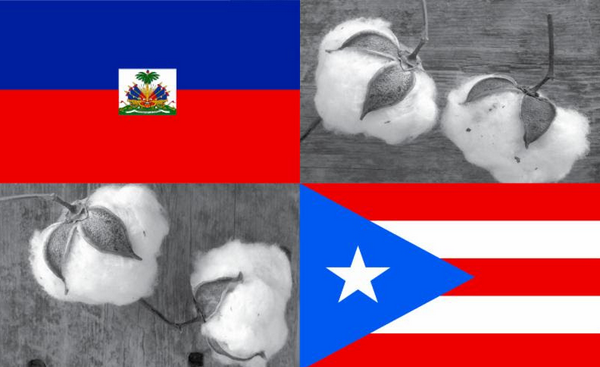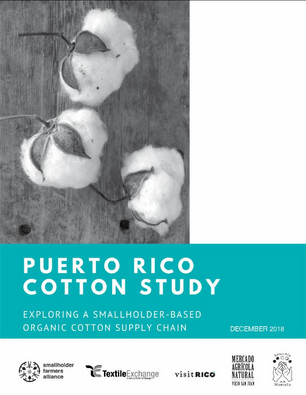
SAN JUAN, PUERTO RICO, December 20, 2018 — A study released today draws on the recent reintroduction of cotton to Haiti by the Smallholder Farmers Alliance(SFA) as the basis for mapping out a similar scenario for Puerto Rico. Both countries share a history of cotton production that has been halted for generations, and both countries have a tradition of small-scale family farming in need of revitalization. Hurricane Maria in 2017 was particularly devastating to Puerto Rico’s smallholder farmers, and a coalition of local organizations there approached the SFA to share its sustainable smallholder-grown cotton expertise to help with the recovery efforts. The Puerto Rico Cotton Study: Exploring a Smallholder-based Organic Cotton Supply Chainis the result of a collaboration led jointly by the SFA and Visit Rico, with support from Textile Exchangeand members of ArmonÃa en la Montaña, an educational non-profit organization in Puerto Rico, and the Mercado AgrÃcola Natural Viejo San Juan.
The spirit of this study was captured by Matilsha Marxuach, Founder and Chief Designer at Concalma, when she said, “I am very excited to be part of an initiative which contemplates bringing together designers, farmers, engineers and economists to create a new sector of natural fibers that can help restore resiliency in our local economy while regenerating communities.” She noted, “This initiative proposes to transform an extractive industry to one that builds community wealth through an intertwining chain that goes from a cotton seed to an end product.”
The feasibility study seeks to explore the potential scenarios for the reintroduction of smallholder-grown, sustainable cotton as a productive agricultural crop in Puerto Rico. It provides a brief history of cotton in Puerto Rico, a short overview of current interest in cotton and natural fibers on the island, and an outline of several scenarios that might be considered when developing an integrated, smallholder-driven organic cotton value chain.
“This study demonstrates the existence of innovative options for local economic development,” said Miguel A. Soto-Class, Founder and President of Centro Para la Nueva Economia, who went on to say that, “The experiences highlighted also offer valuable lessons for other agricultural segments and point to new opportunities that will strengthen institutional capacities and support systems for the sector of small-scale producers in Puerto Rico.”
The next practical step will be field testing several varieties of organic cotton to determine which will be best suited to conditions in Puerto Rico.
Click herefor the Spanish edition of the study, and for more information on the Puerto Rico Cotton Initiative please contact the Project Administrator: retejecaribe@
Regards,
|
|
